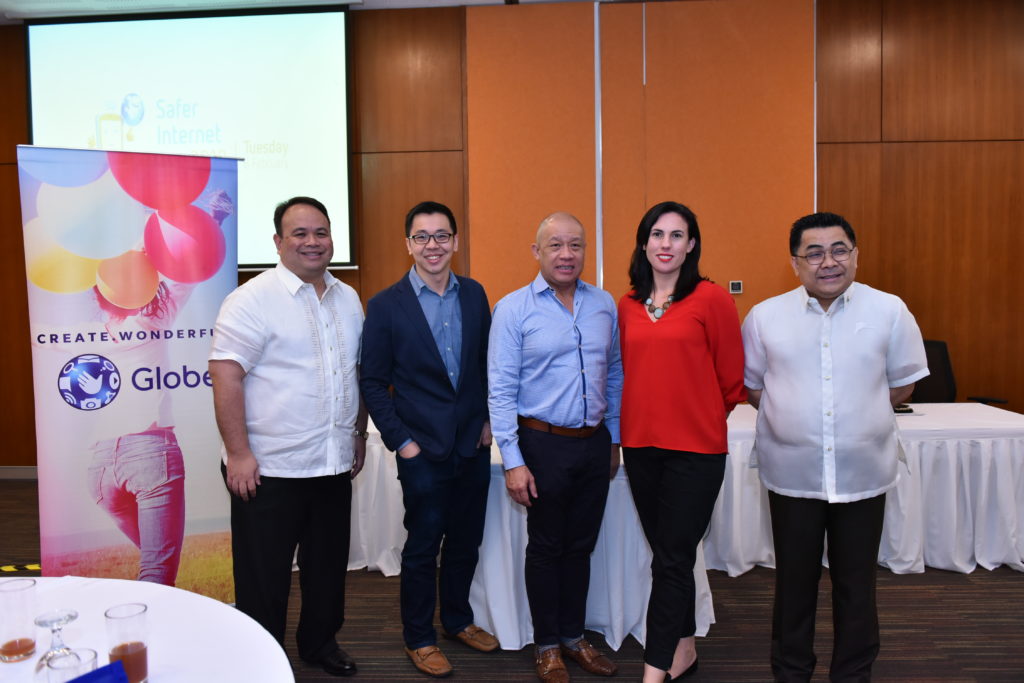
Globe Telecom, Facebook and Department of Education launched a partnership to promote responsible digital citizenship in the country. Globe President & CEO Ernest Cu (center) led the program launch. Cu is joined by from left, Globe Senior Vice President Nikko Acosta, DQ representative Galvin Ngo, Facebook Head of Community Affairs in Asia Pacific Clair Deevy and DepEd Undersecretary Tonisito Umali.
Globe Telecom, Facebook and the Department of Education (DepEd) again joined hands to continue promoting responsible digital citizenship among teachers and students in public and private schools across the country under the “Digital Thumbprint Program” or DTP.
As of end 2017, there are now more than 60 million internet users in the country, 52.2 million of which—or roughly 50% of the country’s population—are mobile internet users who spend about 3.36 hours using the internet daily. Data from a Philippine National Police (PNP) report also bared that half of internet users are adolescents aged 17 years old and below.
Related to this, the DQ Institute, an international think-tank formed in association with the World Economic Forum, revealed in its inaugural 2018 DQ Global Impact Report that 56 percent of kids 8 to 12 years old worldwide who go online are exposed to a variety of cyber risks. Referring to a study of the Philippine internet situation, the same report said 73 percent of children in the same age bracket are exposed to cyber risks, the second highest in a study among 29 countries.
The report cited exposure to cyberbullying, video game addiction, online grooming, online sexual behavior, and digital misinformation are as prevailing cyber risks in the Philippines. As online usage increases in the country, so does the level of risks for users whenever they are online, which calls for more protection by advocating responsible digital citizenship, including critical thinking when online, plus protection against piracy and abuse.
Given this, Globe Telecom and Facebook, in collaboration with DepEd, launched a workshop entitled “Digital Discernment.” The workshop contains topics that teach online users how to think critically online, and effectively identify credible information from questionable information. Content includes practical tips on how to verify and examine online sources of on and identify facts from opinions.
“Collaborating with Facebook and DepEd to enhance our DTP is important to make sure we are putting in the right intervention to address responsible usage of the internet. By the first quarter of this year, we will determine the social impact of this program to students from Grade 7 to 12,” said Yoly Crisanto, Globe Senior Vice President for Corporate Communications.
“Digital literacy is critical to building informed and meaningful communities. Working with partners like Globe we hope to give people in the Philippines the skills and resources they need to help contribute to a positive online experience,” said Clair Deevy, Head of Community Affairs, Facebook Asia-Pacific.
“From an early age, our children are able to access social media through personal mobile phones. Before they start actively engaging in social media or owing their mobile phone, we need to empower our children with digital citizenship skills to mitigate cyber-risks and maximize the opportunity of technology,” said Dr Yuhyun Park, Founder of the DQ Institute.
“The internet, undeniably, plays a very large role in the lives of our youth and students today to the extent that it seems impossible to restrain them from internet usage. What we can do about this is to teach them how to use it properly. It is our Department’s responsibility to educate them to wisely use the internet because this is exactly how we produce individuals who are responsible and critical enough to know the perfect time and way to consult the internet. This is how we raise well-informed and insightful citizens,” DepEd Undersecretary for Legislative Affairs, External Partnerships, and School Sports, Tonisito M.C. Umali, Esq. explained.
The workshop also educates how online community can correctly recognize when information is intended as a joke, done satirically or intentionally crafted as false. Most importantly, Digital Discernment includes empathy as a key value to express online with the aim of not just creating a safer and informed community but one that embraces perspectives and respects differences of opinion.
The pilot “Digital Discernment” workshop was held February 6, 2018, coinciding with the observance of “Safer Internet Day” in the Philippines. One-hundred (100) public high school students from Metro Manila converged at the Mind Museum in Taguig City to participate in the first of many rollouts of the workshop to be held in various areas across the country. The Digital Discernment workshop also supports Globe Telecom’s #makeITsafePH campaign on cybersecurity and cyber wellness.
Launched in 2016 by Globe, DTP first comprised of three workshop modules: Digital Insight (for Grade 7 to 10 students), where participants are taught to help discern proper online behavior; Digital Impact (also for Grade 7 to 10 students) wherein issues on technology’s impact on students’ social activities are tackled; and Digital Ambition (for Grade 11 to 12 students), which equips students with skills on how to use technology to help them achieve their life goals.
At present, DTP has already reached more than 17,000 public and private high-school students in the country, with more than 1,800 facilitators already empowered to teach the program. In a latest impact assessment done by the Karrikins Group, it showed that 94.4% of the participants found the DTP relevant while 93.7% said it helped them build confidence in their online activities. Teachers also said their students displayed a high level of engagement in the sessions.
For schools and other organizations that would like to avail and schedule facilitation of the free workshops, emailbridgecom@globe.com.ph. Workshops also include a trainers’ program to equip aspiring facilitators to hold the workshops independently.